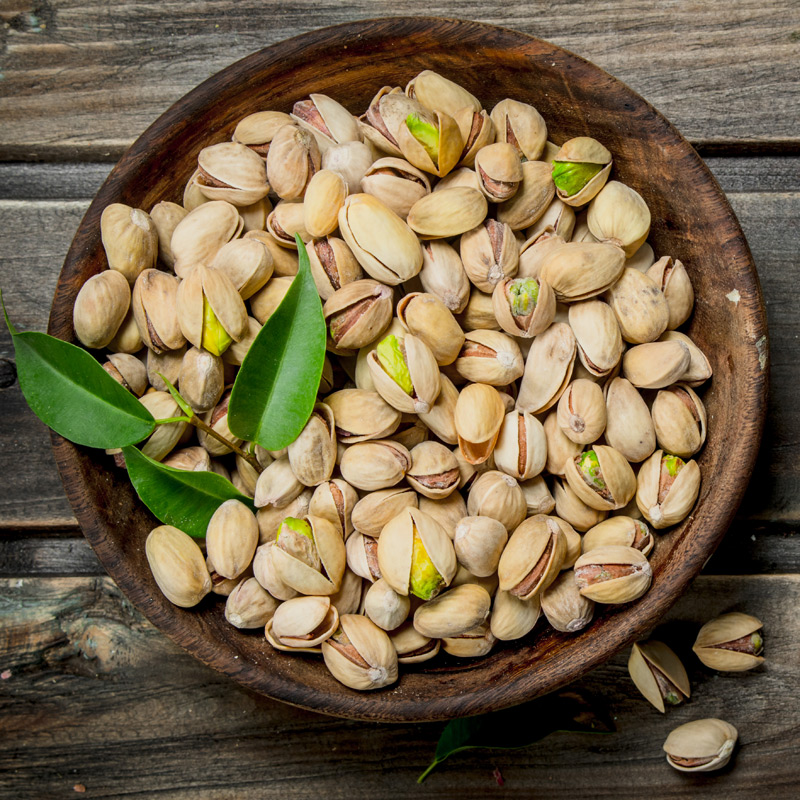
100 gr |
-- |
|
|---|---|---|
| Carbohydrate (gr) | 15.04 |
4928.47 |
| Protein (gr) | 3.59 |
1176.23 |
| Fat (gr) | 12.46 |
4083.43 |
| Fiber (gr) | 1.36 |
445.97 |
| Cholesterol (mg) | 14.64 |
4795.8 |
| Sodium (mg) | 325.27 |
106557.75 |
| Potassium (mg) | 392.16 |
128471.4 |
| Calcium (mg) | 78.15 |
25603.27 |
| Vitamin A (mg) | 46.04 |
15084.01 |
| Vitamin C (mg) | 6.16 |
2019.31 |
| Iron | 0.62 |
203.1 |
Pistachios are rich in protein, healthy fats, vitamins A and B, potassium, phosphorus, and fiber. They are not only a nutrient-dense snack but also offer a variety of health benefits, including heart protection and blood sugar regulation.
100 grams of pistachios contain approximately 572 calories.
Research published in the American Journal of Clinical Nutrition has shown that pistachios can help lower LDL (bad cholesterol) levels. A study involving 28 adults with elevated LDL levels tested three diets: a low-fat diet without pistachios, a healthy diet with one serving of pistachios, and another healthy diet with two servings of pistachios. Those who consumed pistachios experienced a significant reduction in LDL levels, contributing to improved heart health.
Pistachios are rich in lutein and zeaxanthin, the only carotenoids found in the retina and lens of the eye. Studies indicate that diets high in these carotenoids can reduce the risk of age-related macular degeneration and cataracts. Since lutein and zeaxanthin are better absorbed with fat, pistachios, which contain healthy fats, are an ideal source for improving eye health.
Despite being high in calories, pistachios can be helpful in managing weight. Their combination of protein, fiber, and healthy fats helps curb hunger between meals, making them a satisfying snack. A study by UCLA showed that replacing unhealthy snacks with pistachios, which made up 20% of participants’ daily calories over three weeks, led to no weight gain. Additionally, their HDL (good cholesterol) levels increased, while total cholesterol levels dropped.
A study conducted by the Department of Urology at Ataturk Teaching and Research Hospital in Turkey found that daily consumption of 100 grams of pistachios over three weeks improved erectile function in men with erectile dysfunction (ED). Pistachios, rich in the amino acid arginine, enhance blood flow by increasing nitric oxide, which helps blood vessels remain flexible and improves circulation.
A study from Penn State University published in 2015 examined the impact of pistachio consumption on lipid ratios, blood sugar levels, and inflammation in adults with type 2 diabetes. Although pistachios did not directly affect blood sugar control, they improved cholesterol levels and lipid ratios. Regular consumption of pistachios may help mitigate the cardiovascular risks associated with diabetes.
Like other members of the pistachio family, such as cashews and mangoes, pistachios contain urushiol, which can cause allergic reactions in some individuals. Additionally, eating large amounts of pistachios can lead to weight gain, high blood pressure, and digestive issues, especially when consuming salted varieties. Half a cup of salted pistachios can add 263 to 526 mg of sodium, which may elevate blood pressure.
Pistachios are a nutrient-dense food with numerous health benefits. From promoting heart and eye health to aiding in weight management and even improving sexual function, pistachios are a powerful addition to any diet. However, like all foods, moderation is key to avoid potential side effects, particularly from high sodium content in salted varieties.